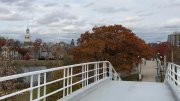This fall's edition of Courses of Instruction lists 943 new choices, some renamed, some renumbered, but most basically new. The tally includes thirteen new Core offerings (and a new approach to fine arts), seven new courses in Harvard's youngest concentration (one-year-old environmental science and public policy), and quite a few that, at least for someone not in the department, call for a double take.
Literature and Arts B-10: "Art and Visual Culture: Introduction to the Historical Study of Art and Architecture" will perhaps settle the waters that splashed up after the fine arts department did away with its introductory survey courses last year. In numerous publications undergraduates cried out that they had a right to a "cocktail party" knowledge of art history if they wanted it. But fine arts stood firmly behind its host of new single-semester courses. Each is an in-depth exploration of one period or perspective on art history—"Roman Art," "Introduction to the Art and Architecture of India," "Introduction to French Painting in the Eighteenth Century"—and are more effective, fine arts believes, than any overreaching "Great Works" course could be. Rather than giving in to the clamor and reinstituting a survey course, fine arts designed Lit. & Arts B-10, which offers "[a] general introduction to an informed and critical experience of art and architecture. . . .While not attempting to cover the history of art chronologically, the course presents different approaches to art, develops visual discrimination, and examines how visual culture affects us and has functioned in different times and places."
This year debuts the likes of Freshman Seminar 19, "Baseball and American Society, 1840-1994"; Economics 1030, "Delay of Gratification"; Government 90mn, "International Crisis Bargaining Strategies"; Fine Arts 246y, "Gothic Tomb Sculpture and Courtly Imagery: A Walk With Madness, Love, and Death"; Slavic 131, "Slavic Science Fiction"; and Philosophy 189, "Aesthetics: Opera and Film." The mathematics department promises Mathematics 204, "Random Walks," and Mathematics 273a, "Knot Theory as an Excuse." Visual and environmental studies offerings include VES 104r, "Faciality: Body (parts), Identities, Powers." And English and American literature and language introduces English 290j, "Poetry, Suicide, Biography," and English 277s, "NAFTA Literature: Language Diversity and Nationhood," which will discuss "the role of anglophone American literature in excluding non-English languages; enforced loss of language and emphasis on dialect; the intellectual place of Native American languages in American linguistics; the literature of minority language groups; and contemporary issues involving statehood and free trade."
Other courses new this year seem just as timely: Government 90mc, "Supreme Court and the Politics of Minority Representation"; Environmental Science and Public Policy 77, "Sustainable Development of the Biosphere: Problems and Policies"; and Women's Studies 118, "Victims of Violence: Introduction to the Psychology of Trauma," which will involve the participation of staff members from Cambridge Hospital's Outpatient Psychiatry Department.
Courses of Instruction has joined the Home Shopping Network, so to speak. For the second year, students can access the course guide via the Internet before it arrives at home. "We put out an early draft in May that was accessible only to Harvard students," says Andrew McRae, a graduate student who works jointly for the Office for Information Technology and the University Library. "The final catalogue becomes accessible to the general public through Gopher software in mid-July. Last August the catalogues from all of the schools were on line, and this is the second year in a row that we've had an on-line catalogue for the Summer School."
Due to construction in progress, students won't head en masse to Memorial Hall this year for registration; both freshman and upperclass registration will occur in Sever Quad. "We're going to have to break the freshmen up and have them come at three separate times because Sever Quad's not nearly as big as Mem Hall," says Peter Cahn '96, undergraduate intern at the Freshman Dean's Office. A few other changes are in store for Freshman Week this year: a more structured and comprehensive overview of science and mathematics offerings, which will be broken down by field and will include advising sessions on course enrollment as well as information sessions for potential concentrators; a reception and movie for gay, lesbian, and bisexual freshman and their friends; and the loss of the "Harvard Discovery" scavenger hunt, which, says Cahn, "was almost unanimously booed down" in last fall's evaluation surveys.
The concentration statistics for the past year have come out as well, and the big five—pulling in 44 percent of Harvard College students— are economics (681 undergraduate concentrators), government (644), biology (627), English and American literature and language (475) and biochemical sciences (423). Five years ago the order was government, economics, English, history, and biology.
Since 1990, biochemical sciences has risen 73 percent to rank in the top five, and history has shrunk 36 percent into eighth place. The number of Afro-American studies concentrators has risen 117 percent in that time, Slavic-languages and literatures concentrators have fallen 54 percent, and those designing special concentrations have grown 111 percent. In the one year since its inception, environmental science and public policy (ESPP) has grown from 26 to 83 concentrators, an increase of 219 percent.
"The stereotype is that we're all ecofreaks who want to save the world," says Cheryl Frank '96, who is an ESPP concentrator. "I was scared of choosing a concentration, of studying all one thing. I like biology, I like political science, but if you asked me what I'm most interested in, I'd say women's studies and English." The reason Frank gives for not concentrating in either of those fields is that she knows that if she doesn't get a science background now, she won't be able to do it later. "I decided to do ESPP because it's so wide-based and varied; I'm studying biology, economics, and policy, which are all things I wanted to take. I'm just not sure how interested I am in environmental science itself. I think it's important, I think this background will be very helpful, but I'm not even a member of the Environmental Action Committee. It seems that lots of people feel the same way."
With Harvard undergraduates declaring their concentrations a full year before those at most other colleges, choosing a field of study can be a hasty decision for some, the first try of many for others, and for a lot of people, a fit that seemed right from the start. Ted Gideonse '96 has changed his concentration three times and is anticipating a fourth change this semester; he started out in East Asian studies, switched to Afro-American studies, then English. He's currently in social anthropology but is applying for a special concentration in cultural studies this fall. "I took three years of Chinese in high school and liked it enough basically to have my entire college search based on locating the good East Asian studies departments," says Gideonse. "By my second year of Chinese here, I had no idea what was going on in the class, and for fear of failure I switched out. I tried out Afro-Am and took the English sophomore tutorial; in English I didn't feel like I was studying literature in enough social context, and in Afro-Am that context was too specific. To get more social context, I switched all the way to anthropology." He thought about combining English with anthropology but soon realized that it would be "bureaucratic hellfire." "A special concentration in cultural studies seemed like an epiphany," says Gideonse.
While "feeling out" various departments may be a worthwhile approach for some, science concentrators, who enter course sequences immediately, often have little time to spare. Students fulfilling the medical school entrance requirements—especially those who aren't concentrating in a science as their primary field—often have all of their electives eaten up by large, introductory science courses.
"I've never thought about switching," says Jane Shaw '95, a biochemical sciences concentrator. "I like the intensity of biochem, not only as a concentration, but in the topics. We don't study birds or trees, but more like why this bird's eyelid twitches when it does." Shaw admits, however, that her laboratory experience has for the most part been an unhappy one, "cramped in vision." "I find the subject interesting," she says, "but I find a lot of things interesting. Choosing biochem was more of an answer to what I was going to do with my life. People in this generation are looking for a definite answer, as a concentration and as a career path. If it had been thirty years before, I think I would have been a humanities concentrator. But what are you going to do with classics? Both of my parents are classics professors. Biochemistry seemed to have a much better outlook."
Jonathan Finkelstein '96 is a visual and environmental studies (VES) concentrator who is also a pre-med. "I knew freshman year that I wanted to pursue something other than a science concentration, something that would complement it," says Finkelstein. "I took Lit. & Arts B-18: 'Theoretical and Practical Explorations of Design' as a Core class, and I said to myself, 'This is something I could see myself doing.' The people in my classes are very different, and it's nice to weigh out lab time with studio time. Sciences are memorization-oriented: 'This is how it is— learn it.' To me VES is, 'This way? That way? You figure it out.' It seems much more like real life." Last semester Finkelstein took VES 172: "Interactive Three-Dimensional Dataworlds." He says, "Recently, a cross section of the human body was scanned into a computer. They've created a proportioned human body they can navigate through—computer planning before cutting for surgery. At first I thought it might be unrealistic to do VES and go to medical school, but it seems it might be more of an asset to be well-ounded."
Yet the drive toward science prevails, and the practicality of a background in government or economics still exerts appeal. To many, humanities concentrations seem to allow much more individual choice when it comes to specializing within the larger field. Though these concentrators feel strong ties to what they study (and are apt to remind you of the fact they are the true "liberal arts" candidates), many undergraduates see concentrations in the humanities as "not career-oriented," or even frivolous. While English and history retain introductory survey courses as necessary contextual overviews, these departments leave the remainder of the program (aside from tutorials and a few distribution requirements), to the interest, or whim, of the concentrator.
But Emily Gardiner '96 chose her concentration—history and literature— for quite different reasons. Technically a faculty committee (and Harvard's oldest undergraduate concentration), "Hist. & Lit." offers a two-year-long tutorial program combined with rigid distribution requirements to be taken within other departments. Undergraduates apply to the honors-only program at the end of freshman year and, if accepted, soon thereafter declare the country or countries they will study. Facing a sophomore rather than a junior essay, and generals at the end of the junior rather than the senior year, concentrators have almost no time to shop around. "I chose it mainly because I liked the academic ethic of the department," says Gardiner. "It's very specific and doesn't appeal to a lot of people. I wanted a critical look at my writing, and I find historical criticism quite interesting, but I really chose it for the literature. I chose to focus on England because it's the literature I love best. I've never thought about switching—it seems a perfect fit."








